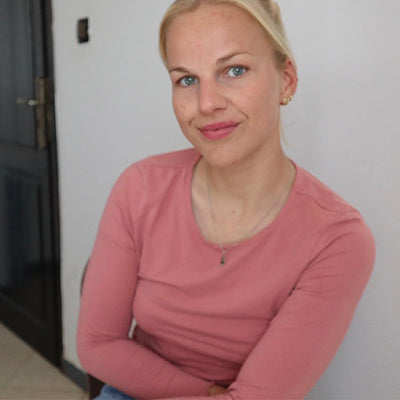Taking the Pressure Off - How I Navigate Modern Romantic Relationships
 Renée Boskaljon
Renée Boskaljon


Renée Boskaljon
Renée Boskaljon is a Dutch, modern-day student living in Morocco, studying an online Masters in Refugee Protection and Forced Migration Studies. Besides spending time surfing Moroccan waters, she aspires to write stories that challenge her beliefs and those around her.
Taking the Pressure Off - How I Navigate Modern Romantic Relationships
Many would say in your early twenties not to take romantic relationships so seriously, as you have plenty of time to figure things out. Yet, for me, a young twenty-something woman, traveling and dealing with a dose of anxiety and sombreness, the continuous theme in any new relationship had been fear. While being single most of the time - my relationships had never reached or even come close to a year - I have always craved the security of a relationship. Yet every time I started one, I was flushed with fear, which resulted from the unbearable pressure of knowing if the one I was dating was the 'The One,' or knowing if the relationship was healthy and supportive of my well-being. I held on to the belief that I was only supposed to continue dating someone if somehow I pictured myself with him for the long term, which I often couldn't. I felt confused why so many young people around me had already begun dating others, sometimes already staying together for years. While at the time, I hadn't spent more than two months with someone. This experience drew me to the work of Ester Perell, a renowned relationship expert and New York Times best-selling author, which profoundly changed my lens on dating and relationships.
Thus, the carefreeness of any time I dated someone had been soon overshadowed by fear of answering questions such as, do I really want to be with him for the next years? Or, more dramatically, can I imagine seeing myself starting a family with this person? Or, am I only spending time with this person because I can't stand being alone? I held a firm self-demand to be genuine in my feelings for myself and my partner. Often, I was told to listen to my intuition, but it's hard to do so when it is troubled by anxiety. Thus, instead of getting closer to my feelings, I drifted away in worries, unable to enjoy the beauty of a burgeoning connection.
At a certain point, I had been with someone I truly enjoyed spending time with. But I would constantly remind my partner of my uncertainty, making myself believe the only way I could avoid the unbearable prospect of hurting him was to seek confirmation that he was okay with me being 'not sure'.
Luckily, over the past year, with much self-reflection, I learned to loosen up a bit, which helped me to enjoy my romantic relationships more. Yet I never felt I could picture myself with someone for a substantial amount of time. I still struggle to let go of this deeply ingrained belief that's reinforced through media depictions of romantic love and societal expectations for young women. I have come to believe that I wish to try to engage in romantic relationships through a new lens- One that focuses less on perfection and the expectation of unconditional love as a certainty to be with someone else for the rest of our lives.
Esther Perell, an influential voice in today's conversation on modern relationships, argues that the conversation surrounding relationships has changed significantly over the past decades. Whereas historically, romantic relationships featured a pragmatic model of marriage focusing on contentment, now we concentrate on an optimization model, which brings along boundless expectations about our partners. We are looking for the perfect partner who checks all the boxes and instantly heals our emotional pain. We are made to believe that passion is absolute, love is unconditional, and that once we find 'The One' we will be certain. Perell describes this as one of the myths we tell ourselves when dating because ambiguity is intrinsic to any relationship, whether it's a romantic one or those we hold with our family members.
In addition, another factor of modern relationships that keeps us in a cycle of emptiness is putting romantic relationships on a pedestal above all other forms of love, which prevents us from finding the love within and cultivating a relationship with the Divine.
In modern relationships, we describe our partner as our soulmate, while historically, we would define our soulmate as God. Thus, now we want our partner to give us what we used to look for in religion, meaning ecstasy and transcendence
All of these expectations we take with us when we begin meeting someone. When I started to date someone new, I often felt an intense lust accompanied by the sensation of flying in the sky with butterflies dancing around me. This enticing encounter with this beautiful person blanketed me from life's sorrows and made me feel safe and protected. But it wasn't long before old fears and habits peeked through the cracks of this short-lived perfection. Why did I find it so impossible to enjoy and be present in the experience of love without projecting expectations and future realities?
The focus on perfection and wholeness has often suffocated my relationships. Any form of imperfection had led me to believe that this relationship lacked the potential to grow into something long-term. Rather, I failed to acknowledge that it was not up to my romantic relationship to provide me with persistent fulfillment. I saw the doubts and moments of unhappiness and dissatisfaction with my partner as a confirmation that I had to let go of this person. With this repeated experience, I agree with Perell's vision that certainty and wholeness in a romantic relationship are a myth since ambivalence and moments of dissatisfaction are natural in any relationship.
Nevertheless, the feeling of ambivalence may be very uncomfortable as we fear that we made the wrong choice. Naturally, as a result, we often choose to run away and cut the relationship, or we decide to stay and yet still feel dissatisfied. Cutting the relationship off is a reasonable option when it harms us, or the differences are too big to overcome. Perel differentiates between life stories and love stories. While a life story allows us to imagine a life together with someone, a love story may thrive for a shorter period yet may teach us valuable lessons and allow us to live precious moments.
When we lean into this perspective, it's easier to surrender to detachment, a gateway to peace and freedom in relationships and life.
However, in some relationships, we may see the potential to transform a love story into a life story. Accordingly, Perell suggests a third alternative in which we may embrace ambivalence showing a form of radical acceptance in which we "accept that we can wholly love a person without having to love every part of them." Accordingly, we shift our attention from a mythical destiny relationship to a developmental relationship focusing on creation rather than perfection. The latter requires both partners to be willing to take responsibility for sustaining and growing the relationship, overcoming and learning from life's many challenges. Radical acceptance is a transcendental practice worthy of implementation in all facets of life. In relationships when we radically accept our partners for who they are, we gift our lovers the opportunity to be seen in their entirety and provide them the chance to do the same. In return, if we were perceiving through rose-colored lenses, we now have the space to see things clearly.
We may thus want to re-imagine our modern relationships. In which we give room to ambivalence and acknowledge that we do not need to like every part of our partner, nor go into a relationship with these concepts of finding 'The One.' I have learned over the years that relationships come and go and perhaps one day stay! Nevertheless, even if a love story doesn't transcend into a life story, we may still gain valuable lessons, feel different types of love, and hold a variety of meaningful people in our hearts. I will continue to engage imperfectly in my imperfect but beautiful love stories and trust that perhaps one day, the love story might evolve into a life story.
